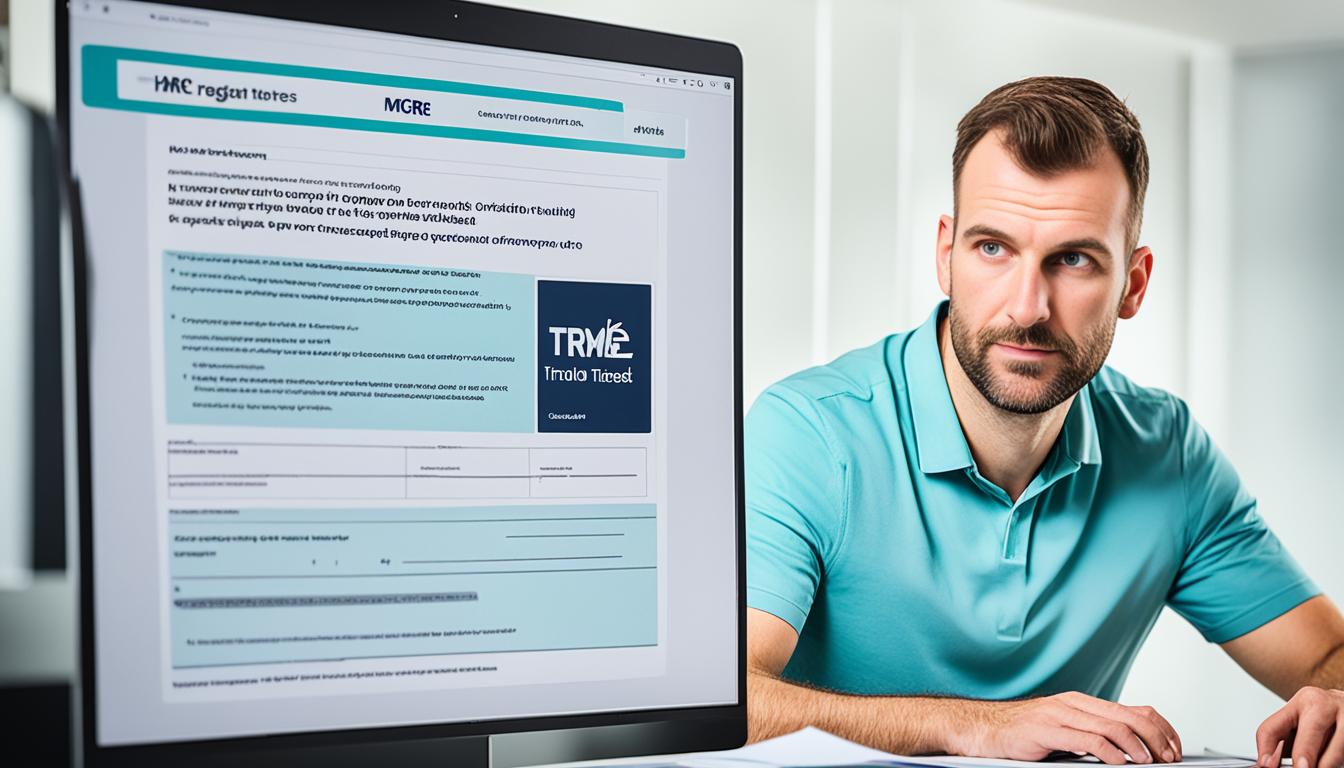To register as a sole trader with HMRC, you must follow a simple process. Being a sole trader means running your own business as an individual and being self-employed. You can keep all of your business’s profits after paying taxes, but you’re personally responsible for any losses. You need to register as a sole trader if you earned more than £1,000 from self-employment between April 6, 2022, and April 5, 2023, or if you need to prove your self-employment status for specific reasons like claiming Tax-Free Childcare or making voluntary Class 2 National Insurance payments.
Registering as a sole trader with HMRC is a crucial step in establishing your self-employment status and ensuring compliance with tax obligations. In the following sections, we will guide you through the steps to register as a sole trader, the requirements and responsibilities involved, and provide valuable information on running a business as a sole trader in the UK.
How To Register as a Sole Trader with HMRC?
To become a sole trader and start your own business, you need to follow a simple registration process with HMRC. Whether you’ve previously registered for self-assessment or not, it is essential to specifically register as a sole trader. This step is crucial to ensure compliance with tax obligations and access various benefits.
To begin the sole trader registration process, you must register for Self Assessment with HMRC. This registration will also enroll you for Class 2 National Insurance contributions, which are essential for self-employed individuals.
Here are the steps to set up as a sole trader:
- Complete the Self Assessment registration form online on the official HMRC website.
- Wait for your Unique Taxpayer Reference (UTR) to be issued. Your UTR is a ten-digit number that serves as your identification for tax purposes. It’s important to keep this number safe as you’ll need it for future interactions with HMRC.
- Once you have your UTR, you can set up your online account with HMRC. This account will allow you to manage your tax affairs, submit your annual Self Assessment tax return, and make payments.
- Keep accurate business records and expenses. As a sole trader, it’s essential to maintain organized financial records, including income, expenses, invoices, and receipts. These records will simplify the process of completing your tax return and ensure you claim any eligible deductions.
- Submit your annual Self Assessment tax return. This is a yearly requirement where you report your income and expenses as a sole trader. The tax return should be submitted online by the deadline, which is usually by the end of January following the end of the tax year.
- Pay your Income Tax, Class 2, and Class 4 National Insurance contributions. As a sole trader, you’re responsible for paying Income Tax on your business profits and making National Insurance contributions for self-employed individuals. The amount you owe will be calculated based on the information you provide in your tax return.
If you’re planning to move to the UK to set up your business, you’ll need to apply for a National Insurance number. This number is essential for interaction with HMRC and accessing various government services.
Registering as a sole trader is a crucial step towards starting your own business. It ensures you comply with HMRC requirements and establishes your identity as a self-employed individual. By following the necessary steps and fulfilling your tax obligations, you’ll be on your way to running a successful sole trader business.
| Benefits of Sole Trader Registration | Responsibilities of Sole Traders |
|---|---|
|
|

Registering for VAT as a Sole Trader
If you’re a sole trader and your turnover exceeds £85,000, it is mandatory for you to register for Value Added Tax (VAT). However, even if your turnover is below this threshold, registering for VAT voluntarily can be beneficial, especially if your business sells to other VAT-registered businesses and you wish to reclaim VAT.
VAT registration comes with additional tax obligations that you need to be aware of. Once registered, you will be required to submit VAT returns on a regular basis, usually quarterly. These returns detail the VAT you have charged on your sales minus the VAT that you can reclaim on your purchases.
It’s important to note that being a sole trader does not automatically make you VAT-registered. You must register separately with HMRC for VAT. If you are unsure about whether or not you should register for VAT, seeking professional advice can help you make an informed decision based on your unique business circumstances.

If your turnover exceeds £85,000, registering for VAT is not only a legal requirement but also an opportunity to grow your business. However, it’s crucial to understand the additional responsibilities and obligations that come with VAT registration and ensure timely submission of VAT returns to avoid penalties and fines.
Running a Business in the Construction Industry
If you work in the construction industry as a subcontractor or contractor, it is essential to register with HMRC for the Construction Industry Scheme (CIS). The CIS is a tax deduction scheme specifically designed for construction work, ensuring that contractors deduct the necessary amount from subcontractor payments to cover tax and National Insurance contributions. By registering for the CIS, you comply with the tax obligations unique to the construction industry.
As a registered subcontractor, you will have a unique tax identification number provided by HMRC. This number is required for any transactions within the Construction Industry Scheme. It acts as proof of your registration and enables contractors to identify you for tax deduction purposes. The tax identification number application process is straightforward and can be completed online through the HMRC website.

Benefits of Registering for the Construction Industry Scheme
- Access to a wide range of construction projects from reputable contractors
- Eligibility for reduced tax deductions by providing the contractor with your unique tax identification number
- Regular and timely payments for completed work
- Inclusion in a government-backed scheme that promotes fair and transparent payment practices
Key Considerations for Construction Industry Businesses
When running a business in the construction industry, it is crucial to remain compliant with the CIS requirements. Failure to register or adhere to the regulations can result in penalties and legal consequences. Some important considerations include:
- Registering with HMRC for the CIS before you commence any construction work
- Keeping accurate records of income, expenses, and payments received from contractors
- Providing accurate information to contractors to ensure proper tax deductions
- Submitting monthly CIS returns on time
- Fulfilling your other tax obligations, such as Self Assessment and VAT, if applicable
By understanding and meeting these obligations, you can operate your construction business smoothly while avoiding compliance issues and potential penalties.
| Key Benefits of Registering for CIS | Key Considerations for Construction Industry Businesses |
|---|---|
| Access to a wide range of construction projects from reputable contractors | Registering with HMRC for the CIS before commencing any construction work |
| Eligibility for reduced tax deductions by providing the contractor with your unique tax identification number | Keeping accurate records of income, expenses, and payments received from contractors |
| Regular and timely payments for completed work | Providing accurate information to contractors to ensure proper tax deductions |
| Inclusion in a government-backed scheme that promotes fair and transparent payment practices | Submitting monthly CIS returns on time |
Choosing a Business Name for a Sole Trader
As a sole trader, you have the flexibility to trade under your own name or choose a different name for your business. When deciding on a business name, it’s important to consider its impact and relevance to your target audience. While the process of choosing a business name for a sole trader doesn’t involve formal registration, there are certain restrictions and guidelines to follow.
Firstly, you are allowed to trade under your own name without any additional registration. This is a simple and straightforward option, especially if you already have a well-established personal brand.
If you prefer to trade under a different name, known as a ‘trading name’ or ‘business name,’ you need to ensure that your chosen name complies with certain rules. These rules help maintain clarity, transparency, and fair business practices within the UK market.
Some of the key restrictions for sole trader names include:
- You cannot include terms like ‘limited’ or ‘Ltd’ in your name, as these suggest a limited company structure.
- Offensive or obscene names are strictly prohibited.
- Certain sensitive words or expressions, such as ‘bank,’ ‘insurance,’ or ‘university,’ may require permission to be used in your business name.
It’s important to note that while you don’t need to register your business name as a sole trader, you must include your own name and the trading name (if applicable) on official documents like invoices and letters to maintain transparency and fulfill legal requirements.
Choosing a memorable and professional business name can help attract customers and establish your brand identity. It’s advisable to conduct a thorough search to ensure that your chosen name is not already in use by another business in a similar industry or niche.
It might also be worth considering your online presence when selecting a business name. Checking the availability of domain names and social media handles associated with your chosen name can help you create a cohesive and recognizable online presence.
In summary, as a sole trader, you have the freedom to trade under your own name or choose a different name for your business. While there is no formal registration process for sole trader names, it’s important to adhere to the restrictions and guidelines set by HMRC to maintain transparency and fair business practices. Taking the time to choose a memorable and professional business name can contribute to the success of your sole trader venture.
Advantages and Disadvantages of Being a Sole Trader
Being a sole trader in the UK offers several advantages and disadvantages. It’s important to weigh these factors carefully before deciding to register as a sole trader.
Advantages of Being a Sole Trader
- Quick setup: Registering as a sole trader is a relatively straightforward process, allowing you to start your business quickly.
- Fewer statutory obligations: Compared to running a limited company, being a sole trader involves fewer legal and regulatory requirements.
- Easier accounting: As a sole trader, your accounting responsibilities are simpler, making it easier to keep track of your business finances.
- Full control over profits: Unlike in a partnership or company structure, as a sole trader, you have complete control over your business profits.
- More privacy in financial information: As a sole trader, you are not required to publicly disclose detailed financial information, offering more privacy compared to some other business structures.
Disadvantages of Being a Sole Trader
- Personal liability for business debts: A significant disadvantage of being a sole trader is that you are personally liable for any debts or legal obligations of your business. This means that your personal assets may be at risk.
- Potential challenges in attracting certain clients: Some clients may prefer to work with established companies rather than individual sole traders, potentially limiting your client base.
- Limitations in tax planning: Sole traders have limited options for tax planning compared to limited companies, potentially resulting in higher tax liabilities.
- Risks to business continuity: As a sole trader, your business’s continuity may be at risk in case of illness or accidents that prevent you from working.
| Advantages | Disadvantages |
|---|---|
| Quick setup | Personal liability for business debts |
| Fewer statutory obligations | Potential challenges in attracting certain clients |
| Easier accounting | Limitations in tax planning |
| Full control over profits | Risks to business continuity |
| More privacy in financial information |
It is crucial to carefully consider these advantages and disadvantages when contemplating becoming a sole trader in the UK.
Conclusion
Registering as a sole trader with HMRC is a straightforward process that involves the hmrc sole trader registration process. To begin, you need to register for Self Assessment and fulfill specific tax obligations. As a sole trader, it’s important to understand your responsibilities, such as keeping accurate business records, filing annual tax returns, and paying both Income Tax and National Insurance contributions.
If your turnover exceeds the VAT threshold of £85,000, it is also necessary to register for VAT separately. It’s crucial to thoroughly weigh the advantages and disadvantages of being a sole trader before making a decision. While being a sole trader offers advantages such as quick setup, easier accounting, and full control over profits, there are also disadvantages like personal liability for business debts and limitations in tax planning.
To navigate the hmrc sole trader registration process smoothly, it’s recommended to seek professional advice and guidance. Professionals can help simplify the registration process, ensure compliance with HMRC requirements, and provide valuable insights on managing your self-employed status.




